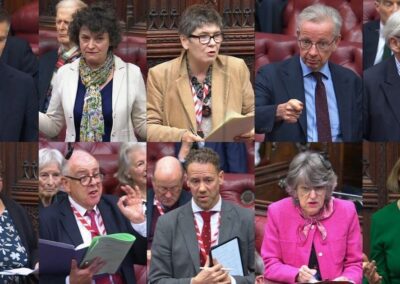As the assisted suicide Bill heads to the House of Lords, a senior peer and leading proponent of assisted suicide has said it is the role of the Lords to uphold legislation approved by the Commons, despite the fact that he has voted against Bills from the Commons on numerous occasions.
Lord Falconer of Thoroton, who has attempted to change the law on assisted suicide on seven previous occasions, is now backing Kim Leadbeater’s assisted suicide Bill as it goes through the House of Lords in his eighth attempt to change the law on the issue in the past 16 years. In an interview on the BBC’s Today programme after the Leadbeater Bill narrowly passed Third Reading last month, Lord Falconer was asked whether the role of the Lords was to “ultimately uphold something that the directly elected members of the Commons have decided to go ahead with”.
He replied “That’s correct”.
However, as has been pointed out by a number of commentators, Lord Falconer has not always abided by the principle that the role of the Lords is to uphold the decisions of the Commons. In fact, on at least six occasions, Lord Falconer has either directly opposed Bills approved by the House of Commons or sought to amend legislation in ways not approved by the Commons.
Acting on behalf of the Government as Lord Chancellor in 2005, Lord Falconer voted to approve Lords’ amendments to a Government Bill and reject an alternative set of amendments from the House of Commons.
In 2007, when voting on the Fraud (Trials without a Jury) Bill, which sought to allow certain complex fraud trials to proceed without a jury, aiming to speed up proceedings and reduce jury tampering, Lord Falconer voted against the Bill even though it had been approved by the Commons.
In October 2011, he was one of 220 peers who tried to vote down the Government’s Health and Social Care Bill – despite it having passed the Commons with a majority of 65 MPs at Third Reading.
When it came to the Tax Credits (Income Thresholds and Determination of Rates) (Amendment) Regulations in 2015, he tried to delay Conservative changes to tax credits despite them passing the Commons.
In March 2022, the Lords voted on an amendment proposed by Lord Forsyth that would have required the government to bring forward assisted suicide legislation within a year. The provision had not been included in the Commons version of the Bill. Lord Falconer voted in favour of this amendment, despite it falling outside the scope and intention of the Health and Care Bill and having no mandate from the elected House. The amendment was defeated 179–145.
More recently still, in 2023, Lord Falconer voted against the 2023 Illegal Migration Bill – despite a Commons majority of 59.
Assisted suicide Bill moves to the House of Lords
Lord Falconer’s comments come days after MPs voted by 314 to 291 in favour of the Terminally Ill Adults (End of Life) Bill at Third Reading, amidst growing cross-party concern about the risks the Bill poses to vulnerable people.
This marks a significant drop in support for the Bill, which passed its Second Reading in November with a majority of 55 votes. By contrast, Third Reading saw the margin shrink to just 23 votes, with a number of MPs who previously supported the Bill voting against or abstaining.
Had an additional 12 MPs moved from supporting the Bill to opposing it at Third Reading, the Bill would have been defeated.
The Bill left the Commons lacking a majority, with fewer than half of all MPs voting for it at its final stage.
The Bill now faces an uphill battle to reach Royal Assent, with campaigners confident that it can be overturned given its continued loss of support.
The Bill had its First Reading in the House of Lords last week and now awaits a date for its Second Reading debate.
Spokesperson for Right To Life UK, Catherine Robinson, said “Lord Falconer appears to have adopted a ‘rules for thee but not for me’ attitude when it comes to the Lords’ approach to Commons legislation. As his own record shows, though, it is indeed possible for Members of the House of Lords to oppose legislation from the Commons, and for the assisted suicide Bill this is precisely what they should do”.












